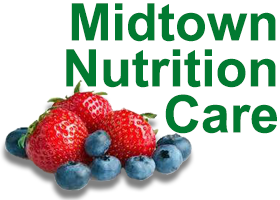ANTIOXIDANTS: BENEFITS & FOOD SOURCES
WHAT IS AN ANTIOXIDANT?
An antioxidant is a substance found in foods that can help protect our cells from damage, and can also help maintain a strong immune system. Fruits and vegetables with bright pigments are some of the best sources of antioxidants.
WHAT ARE SOME OF THE MAIN ANTIOXIOXDANTS, HOW MUCH SHOULD WE GET, AND WHAT ARE GOOD FOOD SOURCES?
BETA CAROTENE:
Beta-carotene is the precursor to Vitamin A. There is a recommended Daily Value (DV) for Vitamin A but not for Beta Carotene. Studies that show antioxidant benefits from Beta Carotene have used doses that range from 15 mg to 180 mg. One cup of carrot juice has 22 mg of Beta Carotene. Other good sources include: dark, leafy greens (such as spinach and collard greens), apricots, cantaloupe, mangoes and sweet potatoes.
LYCOPENE:
There is no DV for Lycopene, but the daily dose of Lycopene often recommended for antioxidant benefit is 10 mg per day. One cup of tomato soup has 26 mg of Lycopene. Other good sources include: raw tomatoes, tomato sauce, watermelon and bell peppers.
VITAMIN C:
The DV for Vitamin C is 60 mg per day but that is based on the amount needed to prevent scurvy (Vitamin C deficiency). Studies using Vitamin C for its antioxidant properties have used doses as high as 500 mg. A typical naval orange has 82 mg of Vitamin C. Good sources include: citrus fruits (such as oranges, grapefruit and nectarines), cantaloupe, strawberries, sweet potatoes and kiwi.
VITAMIN E:
The DV for Vitamin E is 20 mg per day, which is based on the amount necessary to prevent deficiency. Studies using Vitamin E for its antioxidant properties have used doses as high as 500 mg. One ounce of sunflower seeds has 10 mg of Vitamin E. Other good sources include: nuts, wheat germ, vegetable oils, mangoes, avocadoes and sweet potatoes.
CAN WE GET OUR ANTIOXIDANTS FROM SUPPLEMENTS?
Many vitamins have antioxidant properties so it is possible to get antioxidants in supplements. However, it is always best to try to get the nutrients we need from whole foods, which typically provide a more available form of nutrients.
